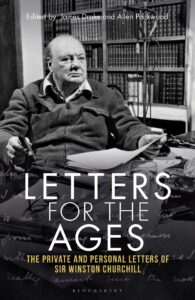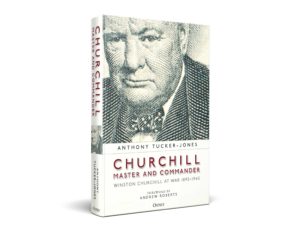Finest Hour 172
Books, Arts, & Curiosities – Churchill Old and New in the Digital Domain

Winston Churchill, Parliament Square, London © Sue Lowry & Magellan PR
June 12, 2016
Finest Hour 172, Spring 2016
Page 45
Review by Catherine Katz
All of the books described in this review can be found through online sites such as Amazon.
There are various statistics floating around in the public domain that predict the demise of print books. In 2011, Amazon reported that e-books outsold print books for the first time. There is likely a ceiling, however, on the number of people who prefer e-books to print books, and as a result the print book industry remains healthy and has more recently outpaced e-book sales. Given this audience’s historical inclination and sympathy for the traditional, most subscribers to Finest Hour likely fall into the camp that prefers print.
Despite this preference, e-publishing is not just a wilderness of insipidity. It can provide the Churchill diehard with the ability to enjoy out-of-print books that are otherwise difficult to access outside university libraries. One such work is a 1941 classic by British barrister and witty historical and travel writer Philip Guedalla. Mr. Churchill has now been made available for Kindle for the first time by leading digital publisher Endeavour Press.
Those who have enjoyed Churchill’s own tales of his early adventures in My Early Life and From London to Ladysmith via Pretoria will no doubt relish Guedalla’s account of Churchill’s years before he became Prime Minister. Guedalla emphasizes the long shadow of Lord Randolph’s influence on his son’s early years in politics and places the future Prime Minister firmly within the context of his family’s dramatic history. The author is perhaps at his best when articulating Churchill’s discomfort with the political upheaval in the years following the Great War.
Guedalla died in 1944, and unlike the original edition that surveyed events through 1941, the digital edition of Mr. Churchill ends with his rise to the Premiership in May 1940, a more natural climax to the earlier years of his life. Much like Guedalla’s observation that My Early Life carried Churchill though the “auspicious day when ‘I married and lived happily ever afterwards,’” Mr. Churchill places its hero on the doorstep of the day that he finally assumes his natural place amongst the giants of history.
Though Mr. Churchill is thoroughly enjoyable, reading an e-book version of Churchill’s life can at first seem a bit bizarre. So much of Churchill’s identity is rooted in the physical presence of thousands of heavy pages by and about him. Without this tangible aspect of the Churchillian experience, the reader is somewhat unable to grasp his enormous historical stature. It is almost more intimidating to read about him in this way. With an e-book, it feels as if the history of such a colossus stretches on for eternity and you will never be able to finish it since you cannot physically see the end of the book. Perhaps a more modern biography might not be as challenging to read on a Kindle, as there is something about the relatively antiquated prose of the 1940s that can only be truly absorbed when you can smell the musty paper that is supposed to accompany supremely flowery language.
The e-publishing industry is one that broadens the Churchill universe in two directions. While it rejuvenates out of print works for an audience that is not routinely spelunking in library archives, it also draws in new Churchillians who have not heretofore engaged with Churchill because picking up a Martin Gilbert tome is simply too daunting.
In the last year, a variety of enthusiastic (if not exactly scholarly) new authors have contributed to Churchill’s digital conversation. As it is this institution’s mandate to review any and all publications that bubble to the surface of Oceanum Churchillium, these authors will receive a few words for their efforts.
Gregory Watson’s The Inspirational Life Story of Winston Churchill (May 2015) and Tristan Clark’s Churchill: The Greatest Briton (June 2015) are two short, self-published works about Churchill’s life and legacy. While there is definitely room for summarized histories within the publishing industry, Wikipedia probably provides a more reliable (and typo-free) biographical overview for those with casual interest in the subject. Patrick Bishop’s Churchill’s Funeral: The End of Empire (May 2015) is another short work of somewhat higher quality. It examines a narrow, unique moment in Churchillian history—an appropriate use of digital self-publishing—and startlingly reminds the reader that Churchill and the Beatles were contemporaneous forces in the early 1960s. Finally, there is Madison Brown’s The 33 Golden Rules: Successful Life by Winston Churchill (June 2015). While the knee-jerk reaction to this is probably one of skepticism, as is the case with most self-help books, it is at its heart an amusing collection of Churchillian quips made friendly for the yoga and cleanse-diet crowd.
The low cost of e-publishing has expanded the media in which one can engage with Churchill, and this is a net gain. If Churchill is to have enduring relevance for future generations, he must be an approachable and democratic figure. Though not all e-books about Sir Winston are created equal, it is a medium that exposes newer audiences to now scarce classics and provides these newcomers with a way in which to take a personal stake in the conversation. Making Churchill accessible on Kindle helps to welcome a previously untapped demographic of Churchillians into the fold, which at its heart can only be a good thing.
Catherine Katz is a Chicago-based writer and financial analyst. She graduated magna cum laude from Harvard in 2013 and received her MPhil in modern European history from the University of Cambridge in 2014.
Subscribe
WANT MORE?
Get the Churchill Bulletin delivered to your inbox once a month.






